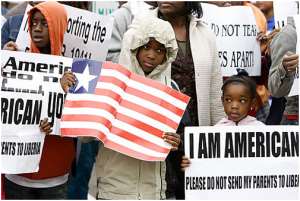
Liberians living in the U.S. received a bit of good news from Washington this week. Scheduled Deferred Enforcement Departure (DED) would be extended for one year, postponing the trauma and chaos of deportation scheduled for the end of March.
The threat of osing protected status brought opposition and protests from several leading U.S. lawmakers including Minnesota Attorney General Keith Ellison, civil rights lawyers, human rights activists and Liberians across America.
An executive order signed this week by the President stated that although conditions in Liberia “had improved and did not warrant a further extension” of the protected status, the foreign policy interests of the U.S. warranted affording an orderly transition period to Liberian beneficiaries.
“The overall situation in West Africa remains concerning,” he wrote, “and Liberia is an important regional partner for the United States. Reintegration of the DED beneficiaries into Liberian civil and political life will be a complex task, and an unsuccessful transition could strain U.S.-Liberian relations and undermine Liberia’s post-civil war strides toward democracy and political stability.”
Hennepin County, Minnesota, home to Minneapolis, has the greatest number of Liberians — an estimated 8,285 — among all counties in the nation. An estimated 35,000 Liberians live in the state.
The Trump administration has already announced plans to end two other high-profile immigration programs, the Deferred Action for Childhood Arrivals and Temporary Protected Status for Salvadorans and Haitians, as well as for people from Nicaragua and Sudan.
Liberians began to come in large waves beginning in 1989, as the country endured almost a decade-and-a-half of civil wars. These conflicts killed some 250,000 people, displaced more than a million more, and left the country with failing infrastructure and 80 percent unemployment.
Forced to flee for safety and economic survival, many Liberians came to the United States and were granted a protected immigration status called Deferred Enforced Departure.
In a series of profiles by the Minneapolis St Paul magazine, the story of Linda Clark stands out. After working in Liberia for an entire year without getting paid, she traveled to the U.S., leaving behind a husband and 2 year old son. “I was coming with the idea of a better life for my family,” she recalled. “I want my son to go to school. He’s 20 years old and still in the 11th grade, losing a year to the Ebola pandemic.”
Watching the children of friends graduate, she felt sad. “I’m happy for them, but yeah. My son, he could be the same way, you know?”




 2024 elections: Resign if you can't be faithful to party - Sagnarigu NDC PC desc...
2024 elections: Resign if you can't be faithful to party - Sagnarigu NDC PC desc...
 Five arrested, remanded over alleged murder of two police officers at Transacco
Five arrested, remanded over alleged murder of two police officers at Transacco
 Tax exemptions better than incentives for churches – Tax Analyst tell Bawumia
Tax exemptions better than incentives for churches – Tax Analyst tell Bawumia
 Transport Minister sues Law Platform Editor for defamation
Transport Minister sues Law Platform Editor for defamation
 Voter registration: Police arrest NPP Treasurer for Mpohor for registering minor
Voter registration: Police arrest NPP Treasurer for Mpohor for registering minor
 "This nonsense must stop" — Lawrence Tetteh vows to march to Jubilee House over ...
"This nonsense must stop" — Lawrence Tetteh vows to march to Jubilee House over ...
 2024 elections: “If indeed you stand for peaceful elections the time is now for ...
2024 elections: “If indeed you stand for peaceful elections the time is now for ...
 I have the attributes to be president of this country — Bernard Monarh
I have the attributes to be president of this country — Bernard Monarh
 Cecilia Dapaah saga: ‘Turf war’ between AG, EOCO, OSP indicates they’re not ‘cor...
Cecilia Dapaah saga: ‘Turf war’ between AG, EOCO, OSP indicates they’re not ‘cor...
 Ghana will become the first African country to embrace blockchain-powered gover...
Ghana will become the first African country to embrace blockchain-powered gover...
